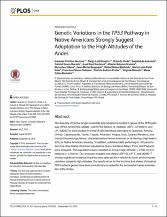Mostrar el registro sencillo del ítem
Genetic Variations in the TP53 Pathway in Native Americans Strongly Suggest Adaptation to the High Altitudes of the Andes
| dc.contributor.author | Jacovas, Vanessa Cristina | |
| dc.contributor.author | Luiz Rovaris, Diego | |
| dc.contributor.author | Peréz, Orlando | |
| dc.contributor.author | Azevedo, Soledad de | |
| dc.contributor.author | Souza Macedo, Gabriel | |
| dc.contributor.author | Sandoval Sandoval, José Raul | |
| dc.contributor.author | Salazar Granara, Alberto | |
| dc.contributor.author | Villena, Mercedes | |
| dc.contributor.author | Dugoujon, Jean-Michel | |
| dc.contributor.author | Bisso-Machado, Rafael | |
| dc.contributor.author | Petzl- Erler, Maria Luiza | |
| dc.contributor.author | Mauro Salzano, Francisco | |
| dc.contributor.author | Ashton-Prolla, Patricia | |
| dc.contributor.author | Ramallo, Virginia | |
| dc.contributor.author | Cátira Bortolini, Maria | |
| dc.creator | Sandoval Sandoval, José Raul | |
| dc.creator | Salazar Granara, Alberto | |
| dc.creator | Petzl- Erler, Maria Luiza | |
| dc.date.accessioned | 2016-03-11T12:40:25Z | |
| dc.date.available | 2016-03-11T12:40:25Z | |
| dc.date.issued | 2015-09 | |
| dc.identifier.citation | Jacovas VC, Rovaris DL, Peréz O, de Azevedo S, Macedo GS, Sandoval JR, et al. (2015) Genetic Variations in the TP53 Pathway in Native Americans Strongly Suggest Adaptation to the High Altitudes of the Andes. PLoS ONE 10(9): e0137823. doi:10.1371/journal.pone.0137823 | es_PE |
| dc.identifier.uri | https://hdl.handle.net/20.500.12727/1534 | |
| dc.description.abstract | The diversity of the five single nucleotide polymorphisms located in genes of the TP53 pathway (TP53, rs1042522; MDM2, rs2279744; MDM4, rs1563828; USP7, rs1529916; and LIF, rs929271) were studied in a total of 282 individuals belonging to Quechua, Aymara, Chivay, Cabanaconde, Yanke, Taquile, Amantani, Anapia, Uros, Guarani Ñandeva, and Guarani Kaiowá populations, characterized as Native American or as having a high level (> 90%) of Native American ancestry. In addition, published data pertaining to 100 persons from five other Native American populations (Surui, Karitiana, Maya, Pima, and Piapoco) were analyzed. The populations were classified as living in high altitude ( 2,500 m) or in lowlands (< 2,500 m). Our analyses revealed that alleles USP7-G, LIF-T, and MDM2-T showed significant evidence that they were selected for in relation to harsh environmental variables related to high altitudes. Our results show for the first time that alleles of classical TP53 network genes have been evolutionary co-opted for the successful human colonization of the Andes. | es_PE |
| dc.description.sponsorship | Conselho Nacional de Desenvolvimento Científico e Tecnológico, Coordenação de Aperfeiçoamento de Pessoal de Nível Superior y Fundo de Incentivo à Pesquisa e Eventos do Hospital de Clínicas de Porto Alegre (Brasil) | es_PE |
| dc.format.extent | 15 p. | es_PE |
| dc.language.iso | eng | es_PE |
| dc.publisher | PLOS ONE | es_PE |
| dc.relation.ispartof | urn:issn:1932-6203 | |
| dc.relation.ispartofseries | PLOS ONE;vol. 10, n. 9 | |
| dc.relation.uri | http://journals.plos.org/plosone/article?id=10.1371/journal.pone.0137823 | es_PE |
| dc.rights | info:eu-repo/semantics/openAccess | es_PE |
| dc.rights.uri | https://creativecommons.org/licenses/by/4.0/ | es_PE |
| dc.source | REPOSITORIO ACADÉMICO USMP | es_PE |
| dc.source | Universidad de San Martín de Porres – USMP | es_PE |
| dc.subject | Variación genética | es_PE |
| dc.subject | Genes p53 | es_PE |
| dc.subject | Genes | es_PE |
| dc.subject | Indios norteamericanos | es_PE |
| dc.subject.ddc | 576 - Genética y evolución | es_PE |
| dc.title | Genetic Variations in the TP53 Pathway in Native Americans Strongly Suggest Adaptation to the High Altitudes of the Andes | es_PE |
| dc.type | info:eu-repo/semantics/article | es_PE |
| thesis.degree.name | Medicina Humana | es_PE |
| thesis.degree.grantor | Universidad de San Martín de Porres. Facultad de Medicina Humana | es_PE |
| thesis.degree.discipline | Medicina | es_PE |
| dc.identifier.doi | http://dx.doi.org/10.1371/journal.pone.0137823 | |
| dc.subject.ocde | https://purl.org/pe-repo/ocde/ford#3.02.00 | es_PE |
Ficheros en el ítem
Este ítem aparece en la(s) siguiente(s) colección(es)
-
Artículos [274]








